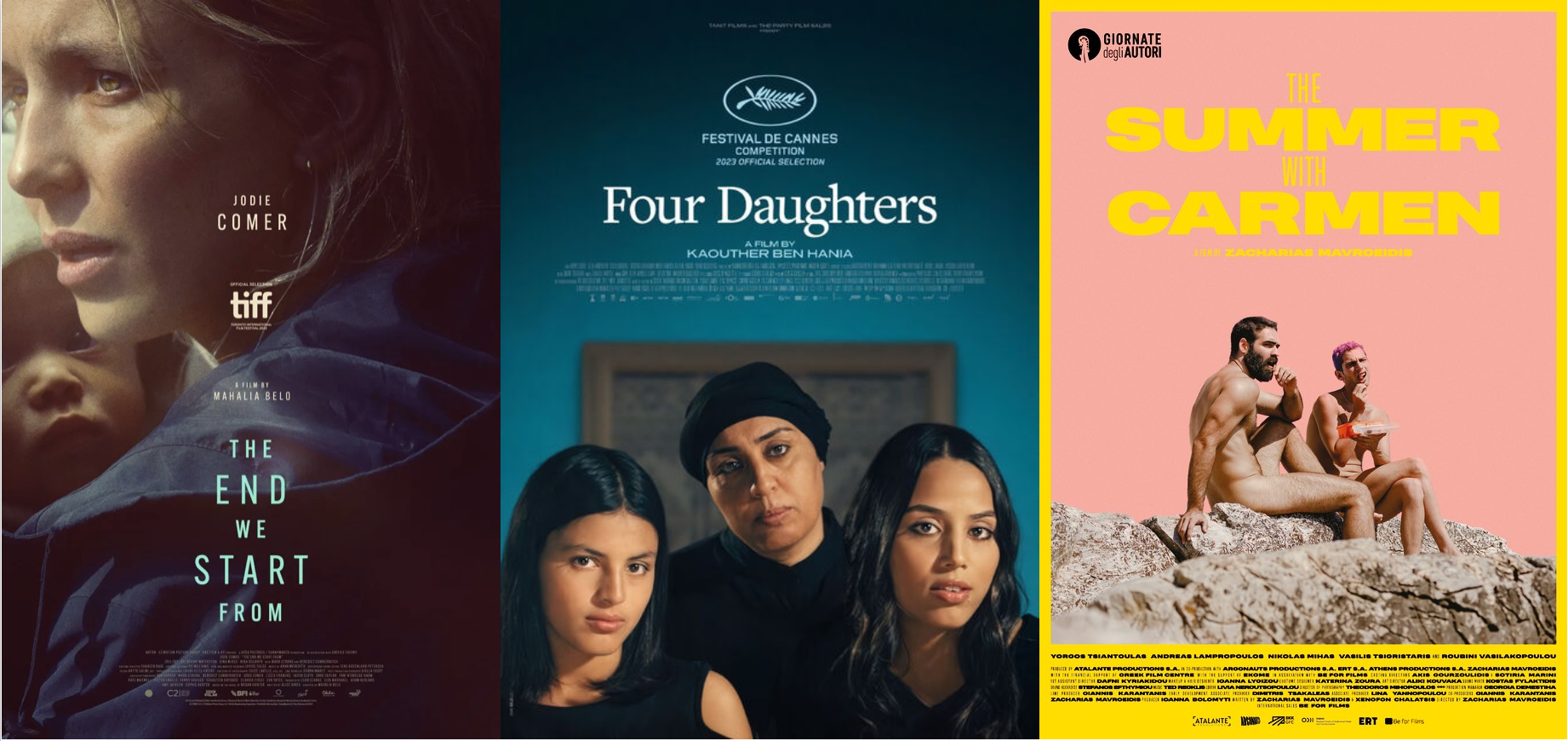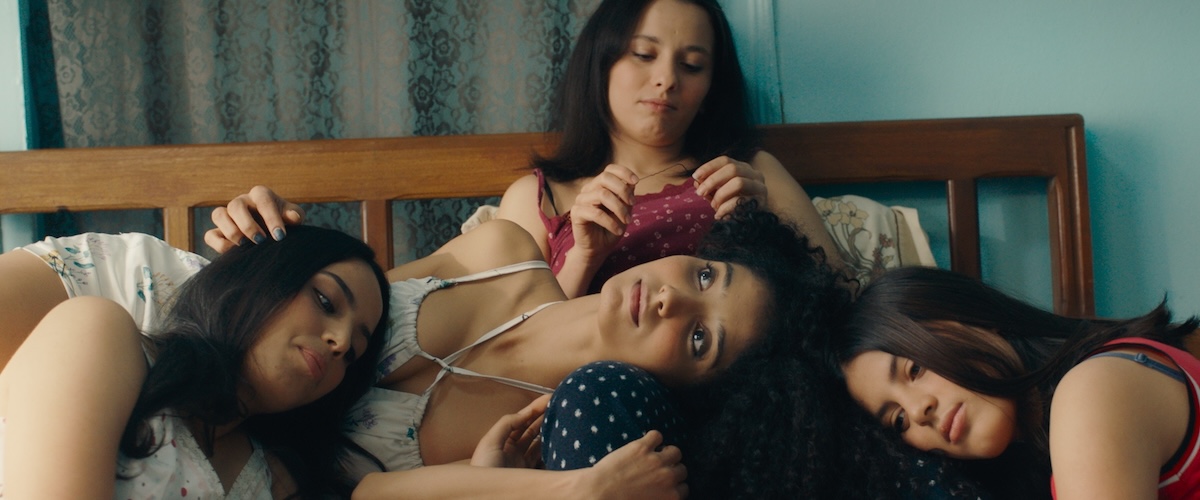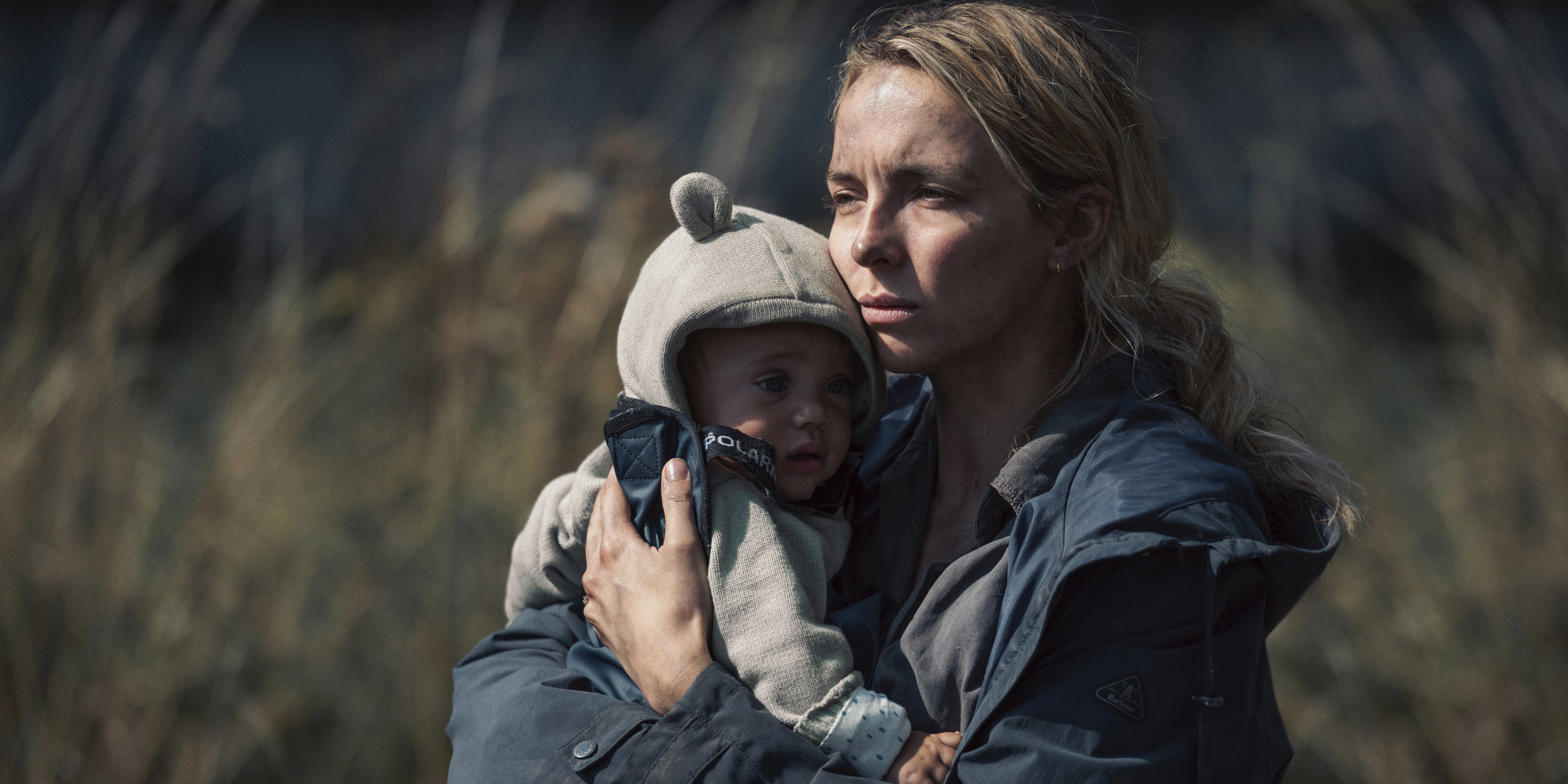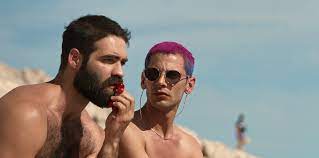Chris Diary 2 - AFI Film Festival - Four Daughters, The End We Start From, The Summer With Carmen
 Tuesday, October 31, 2023 at 11:55AM
Tuesday, October 31, 2023 at 11:55AM by Chris James

The rest of the AFI Film Festival had plenty more highs and lows in store. Movies from many different countries and genres were well represented in the remainder of the slate. Of the potential Oscar contenders, I was able to catch Tunisia’s Oscar submission this year - Four Daughters. The documentary film is helmed by Kaouther Ben Hania, who previously earned an Oscar nomination in 2020 for The Man Who Sold His Skin. The other jaunt abroad I took could not have been more different. The queer Greek comedy The Summer With Carmen served a fun comedy set in large part on a nude beach. This provoked a good bit of emotional whiplash as I saw it right after the climate change disaster drama, The End We Start From.
What did we think of this trio of films? Find out after the jump.
 Four Daughters
Four Daughters
Four Daughters is unlike any film that I’ve seen, documentary or otherwise. We meet Olfa and two of her four daughters, Eya and Tayssir, as they embark on a filmed experiment where they re-enact painful memories in order to tell the story of Olfa’s two missing daughters - Ghofrane and Rahma. For moments where the reenactments become too painful for Olfa, Tunisian actress Hend Sabri will step in to bring her story to life. Actresses Ichraq Matar and Nour Karoui are hired to portray Ghofrane and Rahma, respectively. Almost immediately, we witness the fusion between the hired actors and the real life subjects. Matar and Karoui are immediately welcomed as part of the family, with Olfa stage directing where they would sit based on the relationship she had with Ghofrane and Rahma prior to their disappearance. In between scenes, Eya and Tayssir play around with Matar and Karoui in a manner of closeness one would expect from people who’ve known each other for years.
The actual matter of the recreations is harsh. We begin with Olfa’s first wedding night, in which Olfa animatedly instructs Hend blow by blow of how she punched her husband and used his nosebleed to fool people that they had consummated their relationship. This level of frankness and almost unbelievable ingenuity seems to be a family trait, as Eya and Tayssir take a similar level of commitment to their scenes. In one, the film’s lone male actor (Majd Mastoura) portrays Olfa’s second husband as an abusive drug addict. As he lies down on a bed with a syringe in his hand, Eya hovers over him with a prop knife and confronts him about his actions towards her and Tayssir, who is present. The content of the scene causes Mastoura to flee the scene, asking to speak to the director. Giggling as she plays around with the prop knife, Eya wonders why her experience freaks him out so much. Though the process unearths trauma this family has endured, it also exposes how calloused the girls’ nerves are. They can withstand anything.
Though the film works a lot in recreations, none of the scenes are scripted. Olfa and her daughters describe and then act out their memories. What’s most fascinating is how the filmmaker chooses to film the actors judging and commenting on the scenes they’re going to perform. Olfa and Hend will often argue about the actions that will be depicted. The movie exists in a place between the veneer of film and the fourth wall. It’s not just a story of this family reliving their trauma, it’s about them Re-enacting, arguing and relating with a filmmaking cast and crew to fully process their lives.
Late in the film, Olfa breaks down as she realizes that she has raised her daughters the same way her mother raised her. The chain of trauma wasn’t broken and two of her daughters had left the family. The actress consoles her, saying the chain can still be broken by Eya and Tayssir, who were still in the room. It’s an incredibly salient point. Through re-enacting their story, the family was able to work through how the world and the sociopolitical machinations had affected and shaped their family. Though the outside world wreaked havoc on their internal lives, they had the power to change their futures. “The past doesn’t scare me, the future scares me,” Olfa says. We’re scared of what can happen - what will the world bring us? Can I protect my children? Are we strong enough to move forward? Four Daughters is an exceptional film, giving us a surprising, funny and haunting family drama that packs an emotional wallop. It’s a must see that hopefully makes its way into the Oscars for International Feature and Documentary Feature. A-
Four Daughters is now playing in select theaters.
 The End We Start From
The End We Start From
The threat of climate disaster looms over our heads every day, making it potent subject matter for drama. Based on Megan Hunter’s novel of the same name, The End We Start From presents a harrowing journey one mother takes to find a new tomorrow for her and her child. While Jodie Comer leads the movie with a committed, subdued and surprising performance, it’s not enough to keep this sparse movie afloat.
Our lead, only identified as Mother (Jodie Comer), is introduced while giving birth during a harrowing storm, water seeping into her home. Soon, we see her in a hospital with her baby and partner (Joel Fry). The entirety of London has been upended by a series of storms and the couple seeks to get to higher ground. They make their way to a friend’s home, only to find that in this new world, shelter is something hard to come by and even harder to keep. Much of the movie is spent with Mother and child roaming the English countryside struggling to find a way to survive.
Jodie Comer is an incredibly talented actress, as previously noted the other day in the piece on The Bikeriders. She commands the screen well here, her steely determination being the sole engine driving the story forward. Unfortunately, the film relies on her talent as a crutch, putting all its weight on her walking through various wastelands with thin vignettes breaking up the endless trudge. For example, Benedict Cumberbatch gives our lead respite (and some vodka) midway through the film, but adds little to the film other than an opportunity to give Comer someone to act opposite against. Perhaps the most engaging segment comes when our protagonist takes up with a fellow mother (Katharine Waterston) to head towards an island commune. Finally, the movie feels like it has a voice and purpose, examining motherhood in times of crisis and the way we find community among the toughest of times.
While short on plot, director Mahalia Belo has a great deal of style. With the help of cinematographer Suzie Lavelle, Belo captures the vastness of the flooded world. Comer’s Mother feels small in this great big inhospitable world where no future seems in sight. The opening moments juxtapose a birth scene with the flooding of London, making copious uses of the metaphor linking water and birth. The rest of the movie features less destruction and more greenery, almost as if this flood has washed the world clean. It’s a visually interesting film and signals a strong future for Belo.
Still, beautiful vistas alone cannot sustain a film. The most damning thing about The End We Start From comes from the lack of definition in the world. This was obviously born out of the fear of impending climate crisis that we all feel, multiplied by the psychic scars we all feel from the COVID-19 pandemic. I see the impulse to make elements of the film’s climate disaster feel vague. It speaks to the way information is hard to be disseminated when the world is shifting faster than people can comprehend. Yet, the world feels underdeveloped. No one seems like they are seeking out information in their attempt to survive. Plus, the editing of the movie is jumpy, removing key parts of scenes to provoke disorientation. This adds very little to the narrative. In the end, it feels like a thin post-apocalyptic character piece that is short on both character and plot. C
The End We Start From opens in theaters on December 8th, with distribution from Signature Entertainment.

The Summer with Carmen (To Kalokari Tis Karmen)
Not many movies open with a nude body lying on the rocks of a beautiful Grecian beach. The Summer With Carmen relishes in the gorgeous, sun soaked nude bodies of its hunky cast, and we must thank Director Zacharias Mavroeidis for that. It’s more than just titillation though. There’s a sweet story of friendship at the center of the film, which the movie sometimes loses in its plot machinations.
The structure and rules of a screenplay flash on screen over the nude body we open with. Here we’re introduced to our protagonist, Demosthenes (Yorgos Tsiantoulas) - a hairy Adonis who spends much of the movie putting his gorgeous body to good use fucking every man he sees in Athens. His best friend is Nikitas (Andreas Labropoulos), a twinky former actor turned director who is struggling to find an idea to present a producer that week. Demosthenes suggests Nikitas write about their “summer with Carmen.” It’s here we learn Carmen is a dog that Demosthenes’ ex, Panos (Nikolaos Mihas), got in a knee jerk reaction to their breakup. Though Demosthenes initiated the breakup, he constantly looks for ways to restart the relationship with Panos. In an effort to stay involved in his life, Demosthenes ends up becoming Carmen’s new guardian.
Demosthenes’ pursuit of Panos grows tired rather quickly, mostly because the two have little chemistry and Panos is not a well-defined character. The first act specifically promises the audience a sexy fun romp, but the energy runs out pretty quickly as our lead mostly mopes over a relationship the movie never quite built up. Tsiantoulas has a wonderful energy as a lead and does a good job dramatizing the way Demosthenes jumps through hoops to prove to himself that he’s okay with his breakup. Yet, his comic energy could’ve been exploited more throughout the film.
The biggest missed opportunity comes in the film’s treatment of Nikitas. He spends both timelines trying to write a movie for himself (the past timeline has him working with Demosthenes on a hilariously titled “Sissies”). Yet, we don’t get a glimpse into his life beyond this. Strangely, the movie doesn’t even sexualize him or give us a window into his romantic life. I only point this out specifically since it’s a gloriously horny movie and it feels a little telling that the most fem coded queer character is specifically the one not having any sex. Hanging with the himbo is great, but the movie could benefit from taking time away from Demosthenes and beefing up Nikitas’ storyline. After all, their friendship is the strongest element of the film and we don’t spend as much time with them on screen together as we should. B-
The Summer with Carmen is currently seeking US Distribution.
More from the AFI Film Festival
Follow along with The Film Experience at the AFI Film Festival. Other coverage pieces are below:
-
AFI Fest: Ryûsuke Hamaguchi’s ‘Evil Does Not Exist’ by Abe Friedtanzer
-
Chris Diary Day 1: The Bikeriders, Quiz Lady, Terrestrial Verses by Chris James
-
AFI Fest: “Perfect Days” and “La Chimera” by Eurocheese


